
Location: South Oakleigh, VIC
Established: 1906
Architect: J.B. MacKenzie (1906)/ Dick Wilson (1959)/ Michael Clayton (2006)/ Neil Crafter & Paul Mogford (ongoing)
First Played: 24th Nov 2013
Last Played: 11th Mar 2019
Magazine Ratings

12 (Current)

15 (Current)
An open day was being held at one of The Melbourne Sandbelts highly rated courses, Metropolitan Golf Club. These are usually held a couple of times a year, and what is even better, on a weekend (most Sandbelt clubs have open days but usually during the week). When opportunities like these arise, it is hard not to take advantage.
Note – This is a combination of two visits three years apart, which assisted in the actual story being on the website and a bit more relevant. Photos are predominantly from 2013.
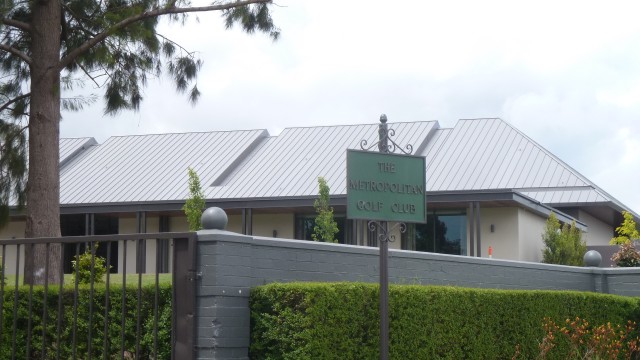
Metropolitan Golf Club Entrance
From the road, the entrance is quite easy to miss, with such a small sign, showing the clubs presence. On both visits to the club, my semi regular playing partner James came along. Luckily we had some nice playing partners for each visit, which always makes the round more pleasurable.
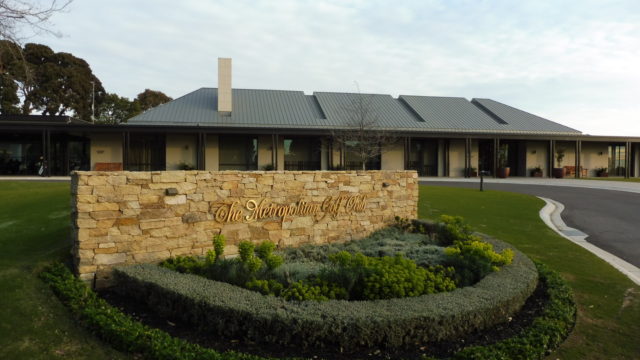
Clubhouse at Metropolitan Golf Club
It is very comfortable sitting in the clubhouse, which has large glass areas to allow a great view. There are a few sections for seating, with the bar, lounge area and dining section all overlooking the 18th green. Fireplaces are spread out through the clubhouse, very cosy in the winter months. A new structure was being built to the left of the clubhouse, which I believe would be new locker rooms, during the 2016 visit.
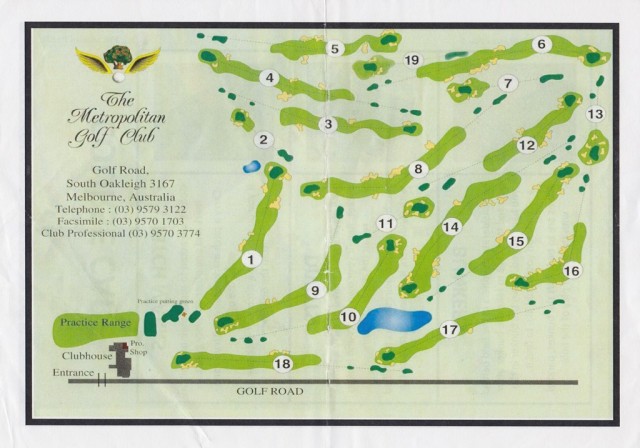
Metropolitan Golf Club Map
Great use of the land, routing in particular, ensures there is plenty of room on each hole. When comparing the course to Huntingdale, right next door, it becomes very noticeable why people enjoy Metropolitan Golf Club. Admittedly there block is larger, the design is far superior.
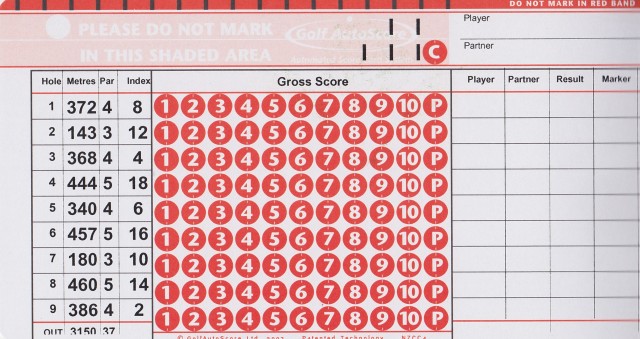
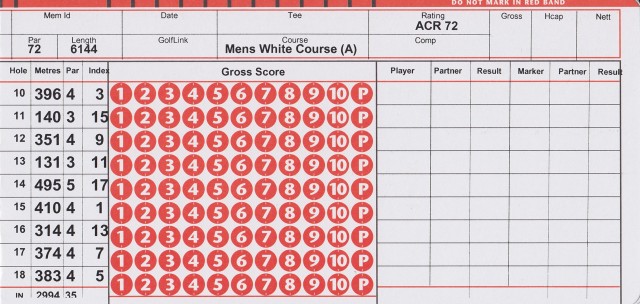
Scorecard at Metropolitan Golf Club
Play on both visits have been from the white tees. Seeing how far back the next tees were, would totally change how the holes play.
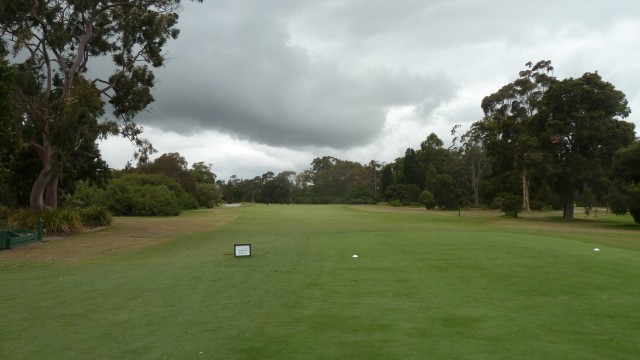
Hole 1 – 372 meter par 4
To start the round is a mid length par 4 which has a dogleg to the left. Bunkers to the left await anyone trying to cut the corner, but remaining close to these allows the best line into the green. For longer hitters it will be easy to find the ball running out of fairway space and into the thick scrub. The fairway is fairly flat for the first portion, but has some slight undulations as you get closer to the green.
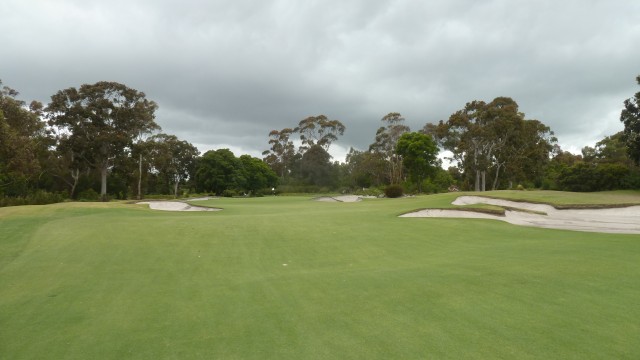
Approach from the 1st fairway
Fairway bunkers to the right must be carried for those who played a safer tee shot out to the right. Left to mid fairway have a green open up, with bunkers down either side. Typical of Sandbelt courses, the bunkers are cut into the green. This is a good opening hole, offering a variety of strategies.
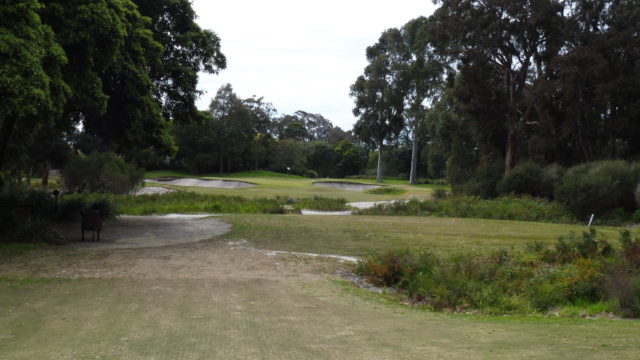
Hole 2 – 143 meter par 3
The second hole is a short-mid length par 3. From the tee sandy waste areas must be carried before reaching shorter grass. The safest place to miss is short.
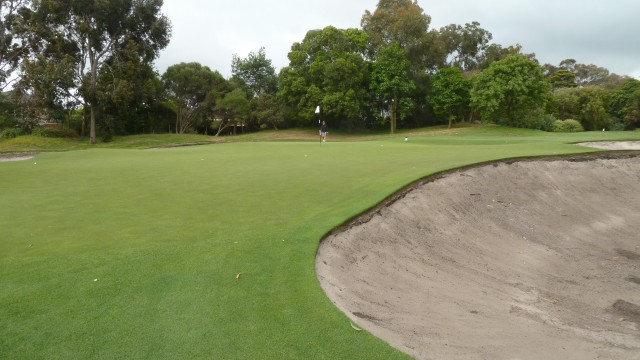
Well protected 2nd green
The green itself, sits in the middle of four bunkers, with a narrow entry. Predominantly sloping from the rear, two small swales are found at the rear. The putting surface is not overly wide and has some gentle slopes. Testing hole requiring an accurate shot. Missing on either side could lead to big trouble.
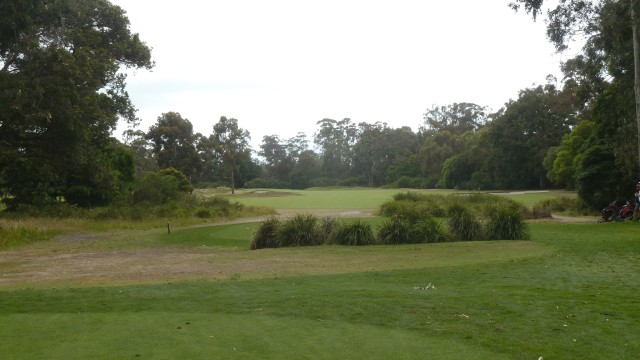
Hole 3 – 368 meter par 4
Another mid length par 4, also turns to the left. Trees run along the right side, which also has a bunker at the turn.
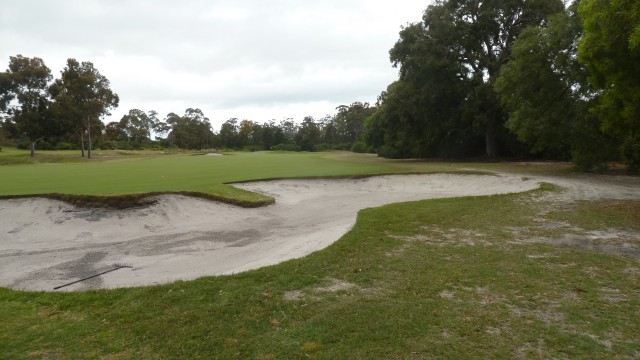
View from behind the 3rd fairway bunker
The inside is quite open, although a mixture of sandy waste and small native ferns are found, along with three trees, which will block most shots to the green.
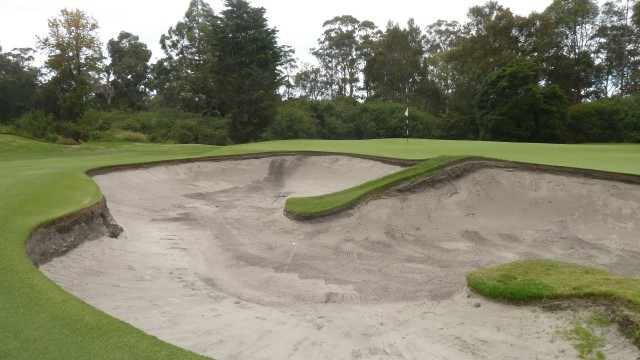
Bunker alongside the 3rd green
Just short of the green is a small groups of mounding, which protect the open front of the green. Missing left could find a large bunker, whilst right or long leave a shot back to a raised surface. Although similar in length and shaping to the first, they both play quite differently.
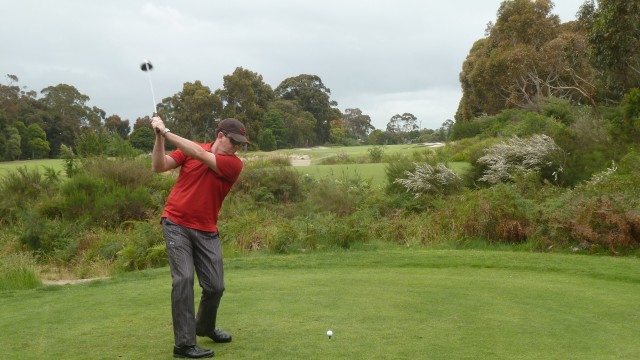
Hole 4 – 444 meter par 5 shortest par 5 and easiest hole
Although relatively short for a par 5, this hole has the capability to punish. Visually this looks a tough tee shot, being tucked back a little with various ferns and shrubs to hit over, whilst fairway bunkers in the distance make the landing area look smaller than it actually is. A couple of hollows are found on the fairway, to change things up a bit, but there is ample room to the left.
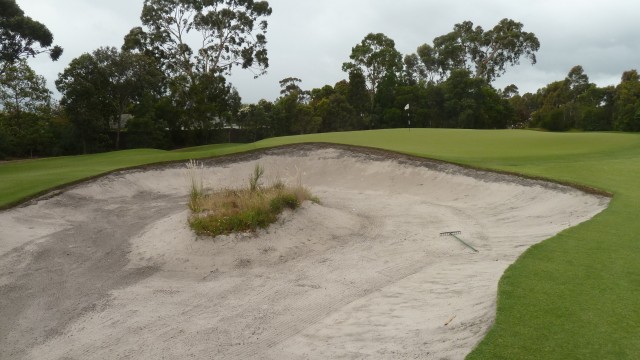
Large bunker beside the 4th green
Playing the second or third shot will be down a gentle slope to a slightly elevated, but smallish green. One trap appears short of the complex to the right, hiding the amount of slope which runs away from the putting surface. The hole has a lot to offer on strategy. Take on the risk with the tee shot for extra distance and find trouble, or find the safe area, a bit shorter. This also applies to the approach. Go at the small green from further out hoping to hold it, or face a difficult shot from the surrounding sand or ground sloping away.
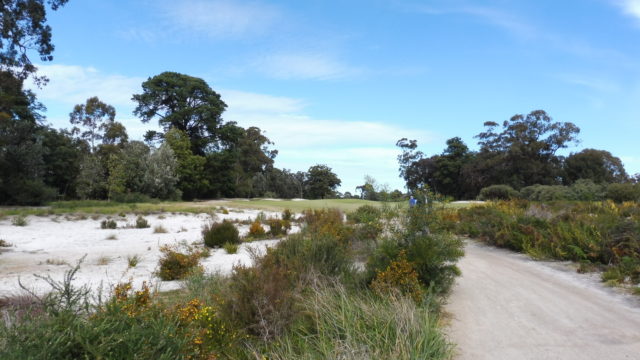
Hole 5 – 340 meter par 4
This mid length hole is one of my favourites for the course. I have never played it well, but I still enjoy it. With a slight dogleg left, this has out of bounds running the entire left side, bordering with Huntingdale Golf Club. A small sandy waste area needs to be carried before reaching the fairway, playing slightly up hill. Being conservative their is a large landing area before bunkers are found either side of the fairway, but this can leave quite a long shot to the green. Beyond these traps the fairway narrows significantly, but will leave a shorter approach, which you really need here.
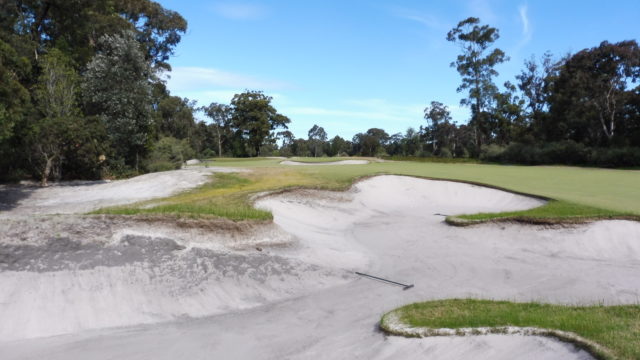
View from the 5th fairway
A large cross bunker is found short of the green, which should be avoided at all costs. From this point the land slopes away slightly to the green, which slopes from the front to rear. The large collection area at the rear looks like it is well used. Bunkers are also found either side of the green, with the right bunker being the more difficult to escape, with the putting surface sloping away from this direction. Visually stunning hole, offering a lot of variety in play, rewarding accuracy with your shots.
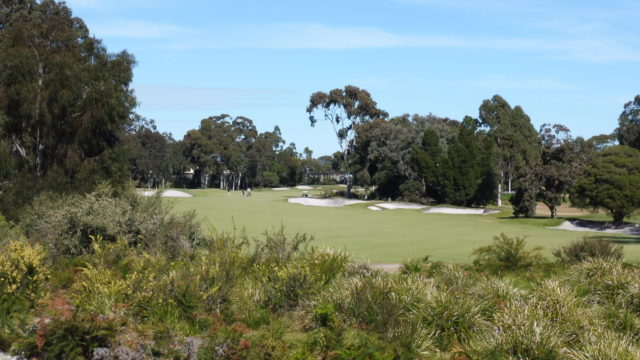
Hole 6 – 457 meter par 5
Another mid length hole, this time a par 5, with a dogleg to the right. From the tee a small carry over scrub is required before reaching the fairway. Longer hitters may carry the inside bunkers, but finding yourself slightly off line to the right brings large trees into play. Sufficient room is available to the left short of the bunker on that side of the fairway.
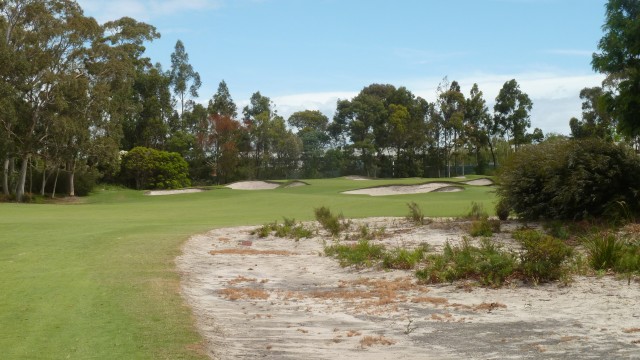
Sandy waste beside the 6th fairway
There is a section of sand waste which narrows the fairway for the second shot before reaching the green. This typifies what the land on which the sandbelt is built.
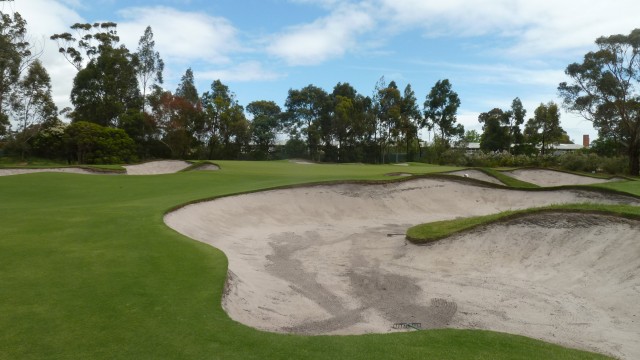
Bunkering around the 6th green
There is a multitude of bunkers around the sixth green. Some slightly short with the rest built into the edges of the green. The putting surface is has some strong slopes and undulation, particularly towards the front. Being above the hole is not ideal. One of my favourite longer holes on the course, requiring thought on every shot. There is some elevation change along the hole along with direction makes it interesting, whilst the ground shows what the sandbelt is all about.
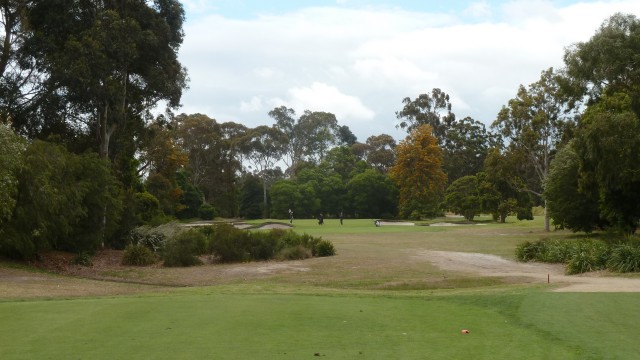
Hole 7 – 180 meter par 3
Coming to the longest and hardest par 3 on the course, this hole is relatively flat from tee to green. The surrounding trees help to bring some distraction to fairly ordinary land. Positioning of the bunkers leaves the front open, allowing the ball to be run in if required.
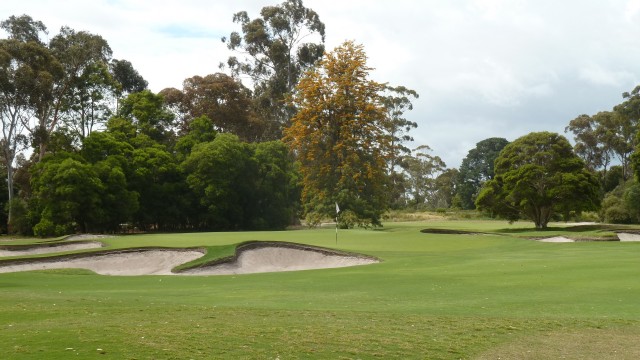
Long 7th green
With a green quite long, compared to being wide, it is heavily bunkered down the left side. The right hand side has a larger solitary trap. Finding yourself in this may leave a difficult recovery with a finger through the middle of the bunker. Not my favourite hole, more for the look, but plays well.
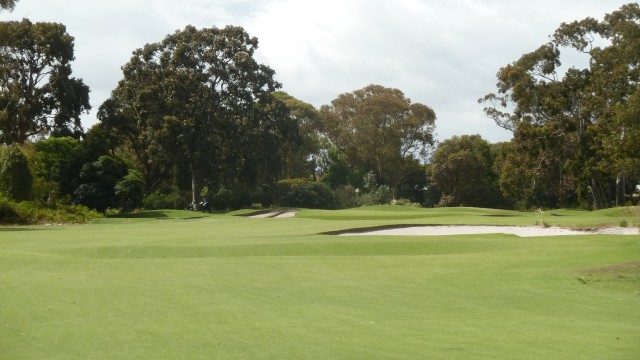
Hole 8 – 460 meter par 5
Unusually the front nine has three par 5 holes, with this being the hardest. Playing with a dogleg to the right, this is a relatively flat hole, lined with trees down either side. This makes for a slightly claustrophobic feeling, but there is ample width to find the fairway. Bunkers are in play down the right at the turn.
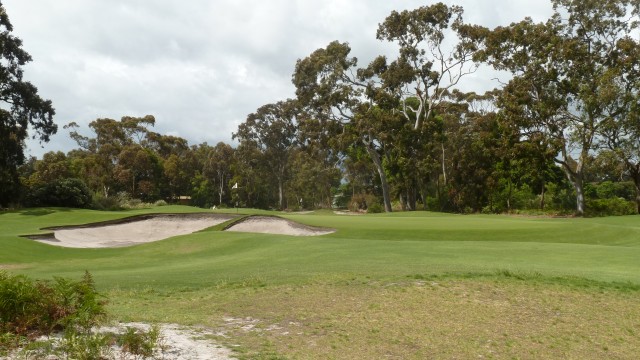
View across to the 8th green
Looking relatively flat from a distance, it looks as though the areas surrounding the green have been channeled out, leaving the surface slightly elevated. This can leave some difficult shots around the green if slightly off line, although with tight grass on the surrounds, a variety of shots can be played.
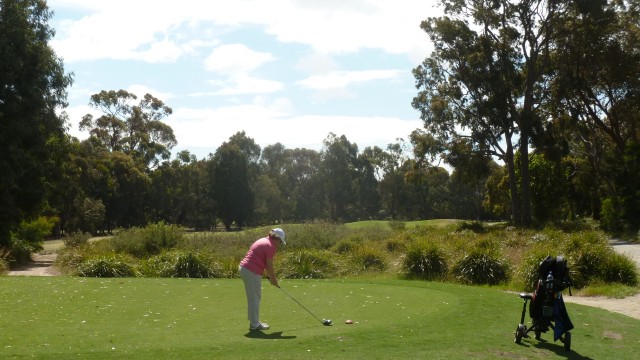
Hole 9 – 386 meter par 4
Finishing the front nine is the second most difficult hole on the course. This long par 4 has a dog leg to the right, with tall trees close to the tee letting the player know not to go to far right. A large mound is found just short of the ideal landing area, with those trying to shorten the hole, finding a fairway narrowing dramatically at the turn.
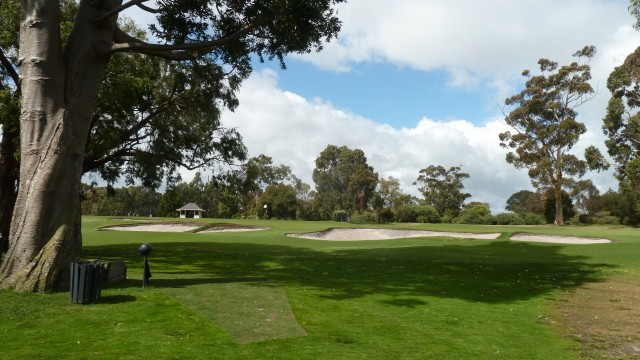
View fromt the 10th tee of the 9th green
The front surface of the green is level with the fairway allowing the ball to be run in. Most surface slope to the left here, leading to the multiple bunkers found that side, so any miss should be short or long. There are a few undulations on the putting surface to contend with, most significant being the ridge through the middle. Nice challenging hole to finish the front nine.
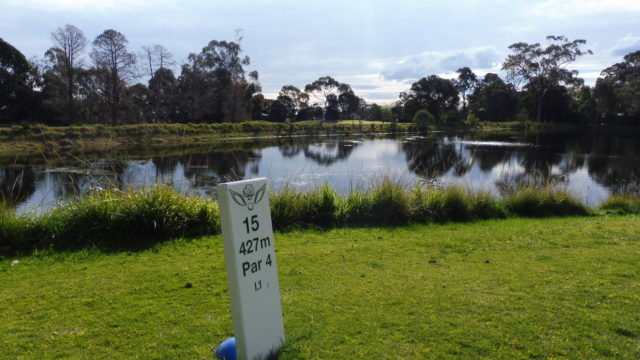
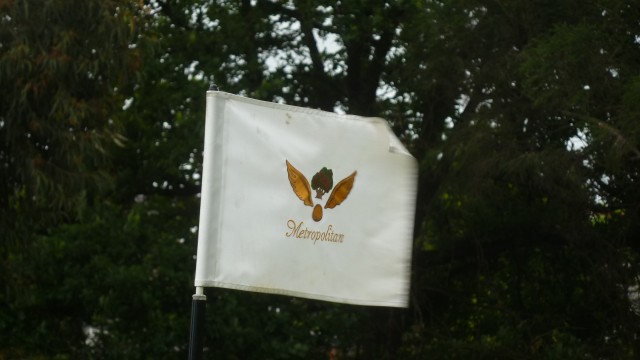
Tee marker and pin flag
The tee markers are your standard, having the club logo, hole number, distance and par, but the addition of the index is unusual, but also handy. Pin flags proudly display the clubs logo, but on the last visit had been revised to have a smaller logo in the corner.
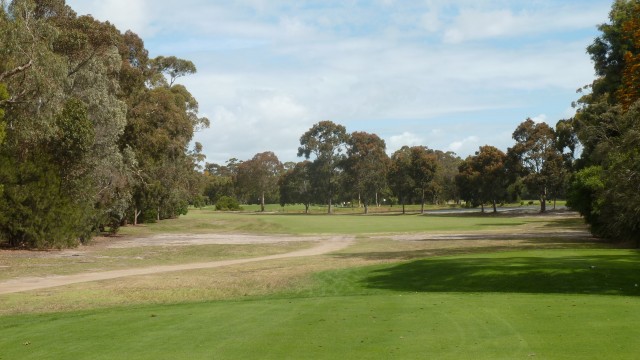
Hole 10 – 396 meter par 4
Another challenging par four is found at the tenth. Gladly this has a dog leg to the left (having the previous three holes turning to the right). This is also one of the only holes to have water in play, which may be found by those going long and straight from the tee. Finding yourself to far left will leave an impossible shot to reach the green.
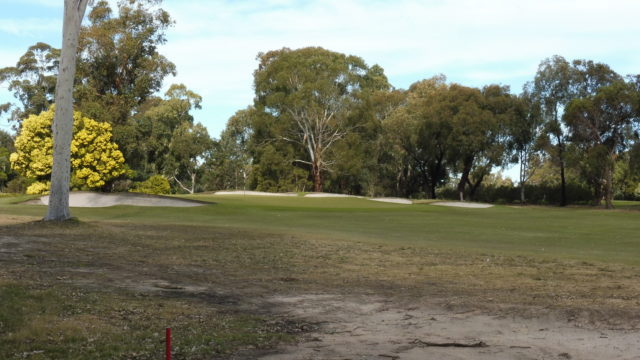
Looking up to the 10th green
With bunkers either side, the entire front of the green is open to run the ball in up the gentle slope. The putting surface here has two tiers, requiring accuracy with the approach.
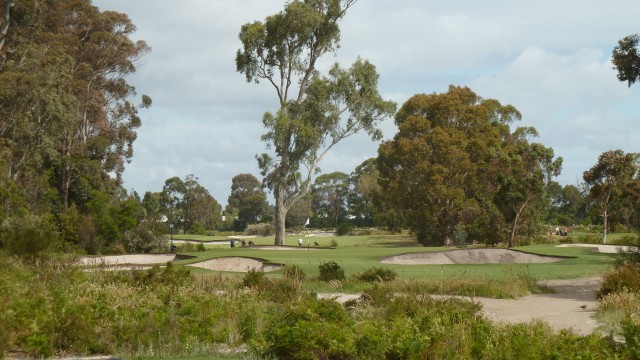
Hole 11 – 140 meter par 3
The first short hole for the back nine, is the easiest par 3 on the course. A carry over natural scrub and sandy waste is required before reaching the green complex.
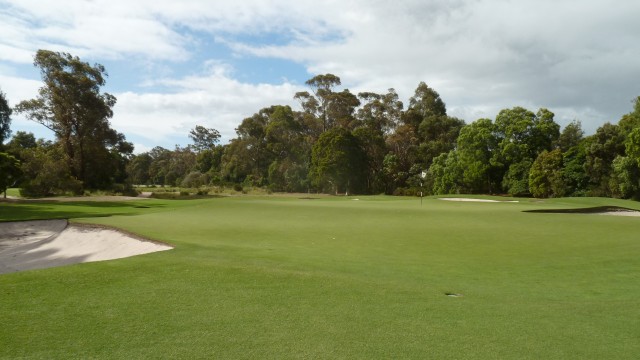
Looking back at the 11th green
Five bunkers are found around the green, with only the rear being clear, but has a large swale. A ridge runs through the middle, sloping away to the front and rear. This hole is all about an accurate tee shot to find the green, although finding the wrong portion, will not guarantee two putts.
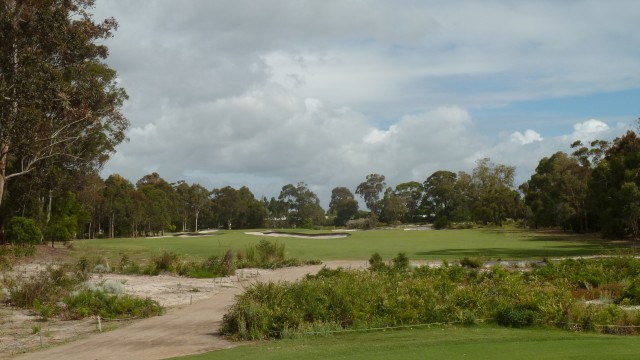
Hole 12 – 351 meter par 4
Another of my favourite holes on the course is this mid length par 4. The fairway is extremely wide, measuring around 70 meters at its widest point, but a large bunker found in the middle requires a shot either side to find the short grass. The fairway slopes mainly from the right, but playing down the left side, with a tighter shot, leaves a great angle into the green.
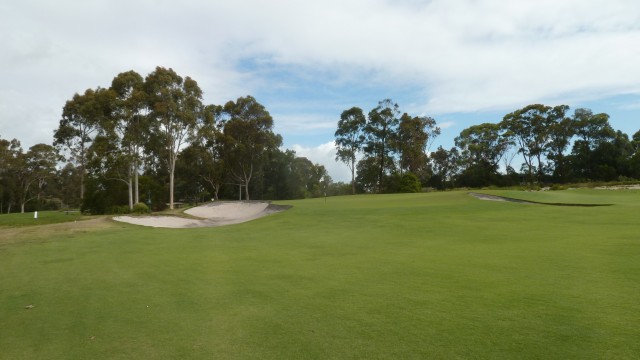
Approach from the 12th fairway
Playing from the left leaves an open front to the green. From the right, the green has a small, but deep bunker in the middle of the green to be carried, with the putting surface sloping away. Great design showing that width, doesn’t necessarily mean an easy hole. With a good green design, this hole plays extremely different, depending on which side of the fairway you approach from.
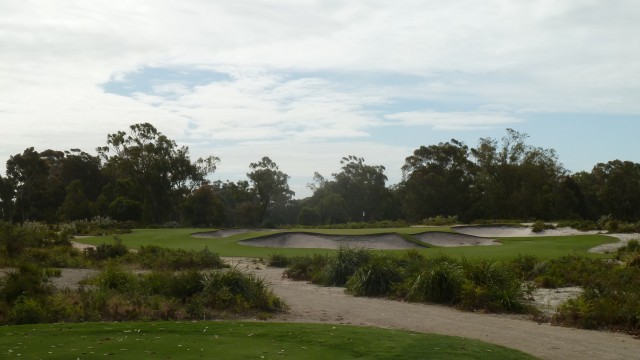
Hole 13 – 131 meter par 3
The last par 3 for the day, is the shortest hole on the course. A waste area has to be carried before reaching the green complex.
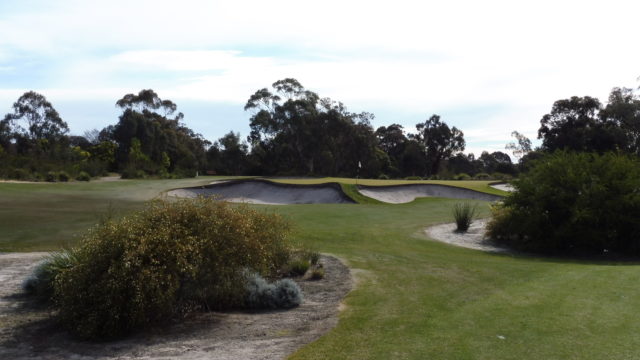
Looking across at the 13th green
Protected by three bunkers, the front being the largest, this must be carried to reach the green.
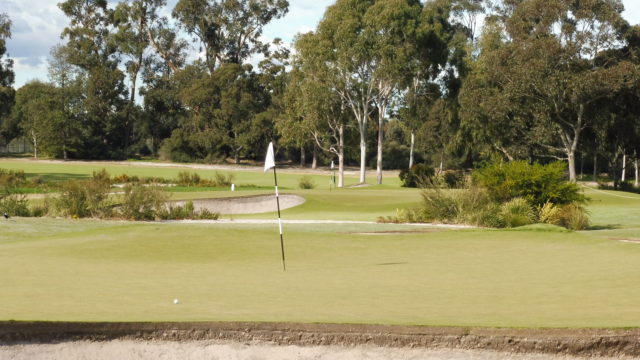
13th green with 12th in background
The putting surface slopes significantly from the rear to the front, although the area gathers towards the front, preventing balls running off the front into the bunker. Might be the shortest hole on the course, but requires some thought on where to land the tee shot.
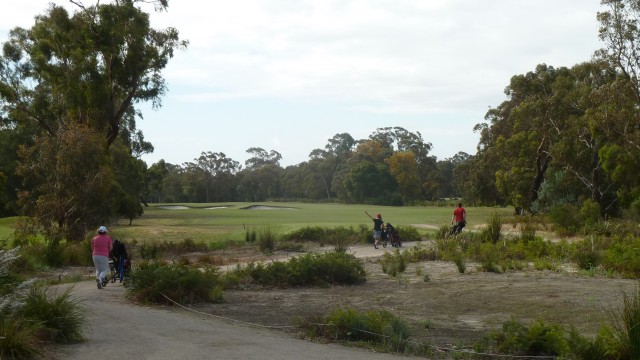
Hole 14 – 495 meter par 5
From the shortest to the longest hole on the course. Playing up a gentle incline, this hole turns to the left, with bunkers on the inside of the turn. There is ample room to land the ball to the right if required, making the hole slightly longer.
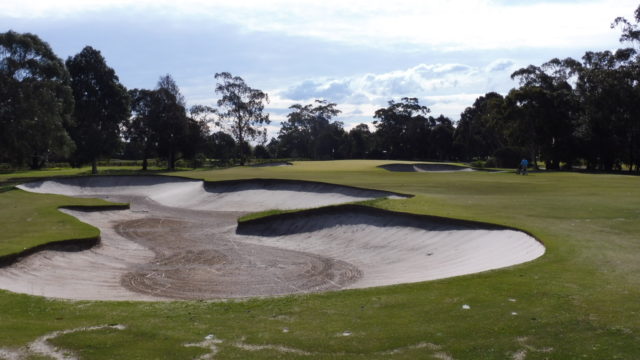
Bunkering short of the 14th green
For most people this will be a true three shot hole. This is where the second lot of fairway bunkers will come into play, again on the left side around 80 meters short of the green. Bunkering either side of the narrow entry to the putting surface are also found, with the ground sloping from the rear of the green.
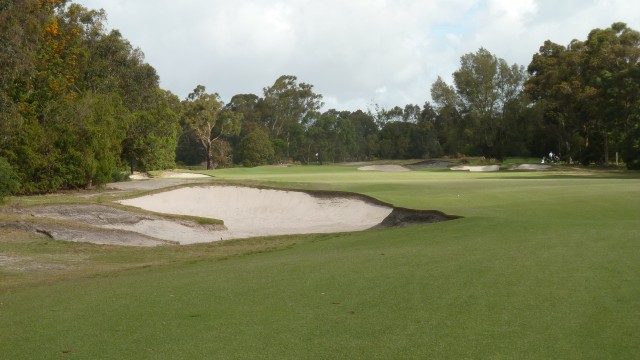
Hole 15 – 410 meter par 4
From the longest hole to the longest and hardest par 4. This is another turn to the left which will require two great shots to reach the green in regulation. One trap is found on the inside of the turn, with varying amount of sand on the edges of the fairway.
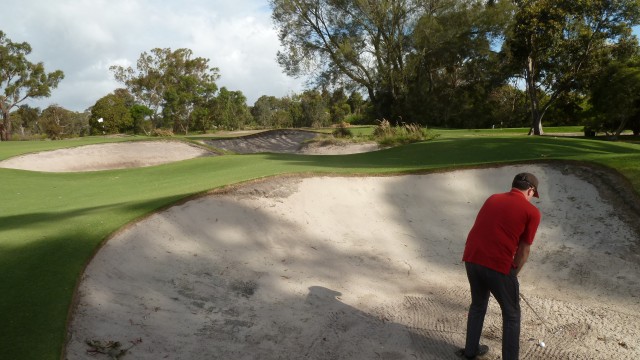
Well bunkered 15th green
Playing to a rear pin or to the right of the green, will present the most difficult approach, with numerous bunkers protecting this side. The putting surface slopes from rear to front, but also right to left. By far one of the toughest holes on the course, especially with the approach.
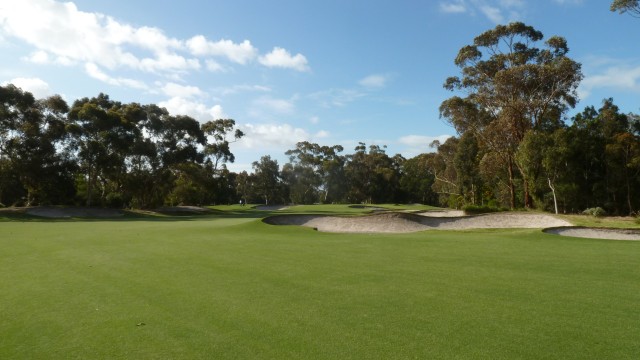
Hole 16 – 314 meter par 4
Measuring as the shortest and easiest par 4 on the course, this has a sharp dogleg right. This is a true risk reward hole for those taking on the green from the tee. There is a multitude of bunkers down the inside of the turn, waiting to catch any shot offline cutting the corner. Taking the safer options sees a wide landing area with mounding at the end of the fairway.
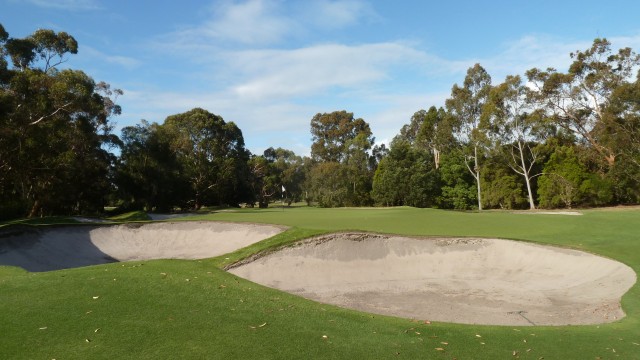
Well protected 16th green
The green angles away to the right, with a large false front. A trap is located in each corner to catch any misguided shot. A good short par four no matter how you play it.
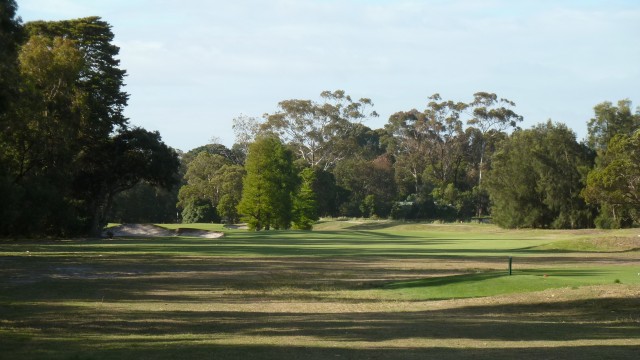
Hole 17 – 374 meter par 4
The penultimate hole is a longer par 4 with a slight turn to the left, playing down a gentle slope. A bunker is found on the inside of the corner, whilst sandy waste lines the right.
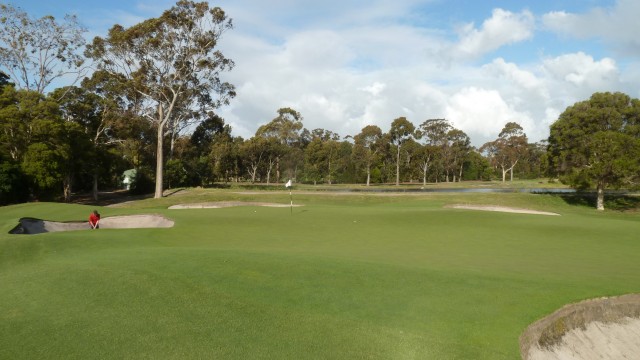
James playing out of the 17th bunker
Water is located to the right of the fairway on the second shot, but should not really come into play. Trees to the side of the fairway will for those who have driven down this side from the tee. The green is elevated with a large false front with bunkers either side. A challenging hole to start the run home. Finding yourself out of position will penalise.
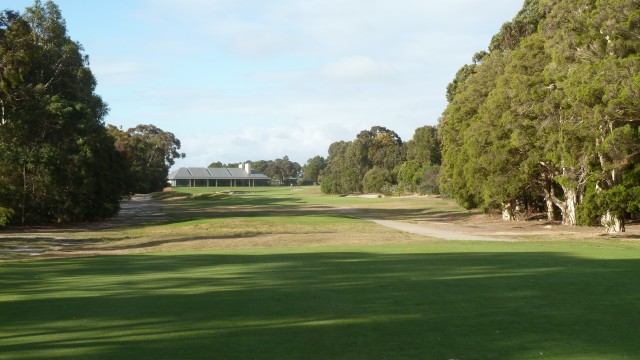
Hole 18 – 383 meter par 4
A similar length hole to the 17th, but this time playing fairly straight up a hill. Bunkers are found to the right, beyond which the fairway starts to narrow.
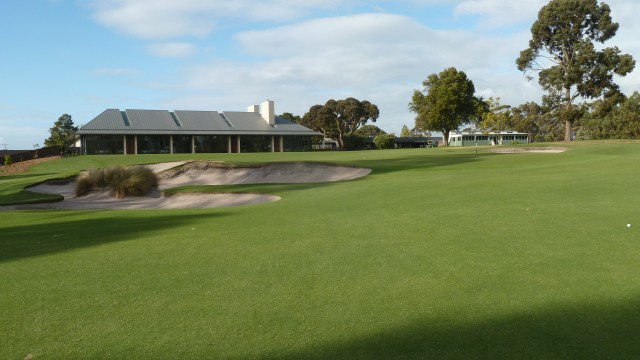
View from the 18th fairway
Most of the ground slopes away from the right around the green, leading to the large bunkers on the left of the complex. A smaller solitary bunker is located right, where ground channeled away to allow the green to be slightly elevated. A tough hole to finish the round with a great view from the clubhouse.
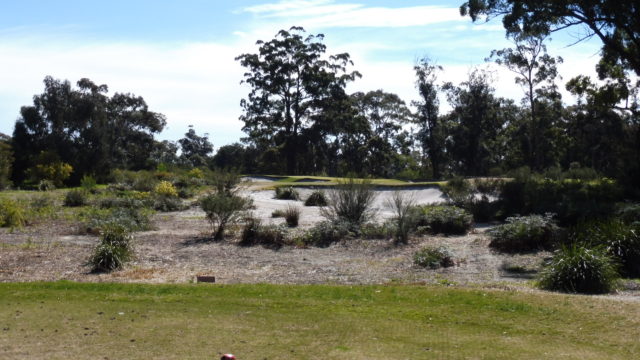
Hole 19 – 119 meter par 3
Every course should have a 19th hole, I’m not referring the clubhouse watering hole either. Although extremely short, this is still a challenging hole, playing up a gentle incline over sand waste, to reach the green complex.
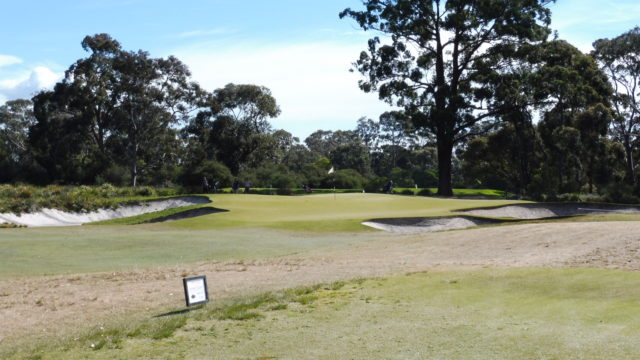
Looking across at the 19th green
Bunkers are found either side of the green, leaving the best miss slightly short right. The putting surface has some gentle undulations and slopes mainly from the rear to front. Not the greatest 19th hole I have ever come across, but certainly one that some thought has been given with the design.
In summary this was an extremely enjoyable course, that all players can appreciate. There was ample room on most fairways to hit the ball, with the primary rough, being penal but not to the point where the ball could not be found. Also most of the areas surrounding fairways and greens, were clear on the ground, allowing for a minimum in lost balls. There are areas where this is definitely possible, but seemed to be more spread out around the course.
More importantly the course offered reward, for those taking on risk, but made it slightly harder for those taking on the safer lines. In particular greens being angled in certain directions and the placement of bunkering. This was a lot more noticeable on my second visit, so I look forward to returning. The course really shows how good design can make the course challenging, without toughening up conditions to achieve the same effect.
Looking at the course makeup:
- Hole Directions – There was a good variety overall allowing for conditions to have wide ranging effects during play, although on numerous occasions direction was the same on consecutive holes. The 16th had a westerly facing tee, which may have issues late in the afternoon with sun
- Hole Lengths – Par three holes lacked a good variance in distance, the majority in mid length, with three found within a twelve meter difference. Par four holes ranged from short to long with the majority being longer in distance. Par 5 holes ranged from mid to long with the former being the majority
- Hole Layout – There was a decent mixture in how the holes played, although an overwhelming majority tended to favour turns to the left, where two shots or more were required to reach the green. This outnumbered those turning to the right by two thirds.
A course I will go out of the way to play hopefully every year, when an open day is held.
How to play at The Metropolitan Golf Club:
1. Be invited by a member
2. Be an interstate or overseas visitor who is a member of a golf club
3. Look out for charity days held at the course (one of these can be found on the clubs website)
I initially played at the club via a charity day.

